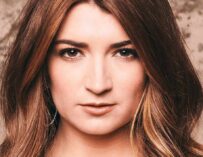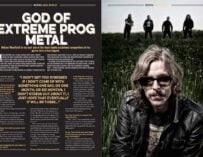
Jessica Lynn: “If I cannot sing the song back the day after I write it, I discard it. If I can’t remember my own song, it’s not that catchy and no one else is going to remember it.” Photo: Scott Vincent
We chat with the Brooklyn-based country star who overcame career-threatening health issues to deliver defiant new album ‘All I Own’
Even the most laser-focused of us can’t always predict what’s around the next corner. For Jessica Lynn, an independent country artist from Brooklyn, what should have been a routine sinus surgery became a career-threatening fight with the muscle tension dysphonia (MTD) that left her unable to sing. Her latest album, All I Own is a testament to resilience, shaped by both the specific challenges posed by the music industry and those personal health struggles.
It’s a tale of perseverance and determination from a songwriter renowned for their commanding vocals and magnetic stage presence. As she herself sings on the song of the same name, I Never Said It’d Be Easy. Here we learn all about the new album’s remarkable conception and Lynn’s desire to overcome…
Listen to Songs In The Key Of Country Pop
What was the plan for this album?
“I really wanted to make something that was genuinely and authentically me. No trying to fit music that would be good on a big festival stage, or that would do well on country radio. I wanted to write and make music that I just love to make and sing, As I’ve grown in my career, I’ve really learned those lessons that my biggest hit songs were ones that were quite different, and they were ones that I thought more with my heart than my head. So I felt more and more comfortable pushing genres and boundaries. I grew up as a New Yorker. I grew up on everything from soul music, to rock ‘n’ roll, Motown… and that’s all kind of present in here.”
Was the muscle tension dysphonia happening while you were writing the songs, or did it stop you from writing?
“I have been chronically ill for years. No one would ever know it, because I’ve gotten very good at hiding it while performing. There probably hasn’t been a tour that I haven’t been sick on in the last seven years. I had really bad sinuses, they just weren’t functioning properly, which I didn’t even know till this year could have been something I was born with. The hardware up there was not properly wired. I was always terrified to get surgery, because obviously, as a singer, that’s everything.
“I was getting sick a lot in 2023, to the point where I was on antibiotics every month-and-a-half. It was making me feel so sick, and I was always in pain and flying with sinus infections, which are so horrible. I decided to go for it in January last year, and everything went amazing with the sinus surgery. It was a very painful and long recovery, but I now function great, which is fantastic.”
“We usually tour May through Christmas of every year, so my downtime to write is always January through March. I hit the New Year, I start putting all new ideas together, because I’m not somebody that can write on the road. The schedule is so fast, I’m always so tired or concerned with logistics, that I’m just not in that frame of mind, especially as an independent artist who’s handling the tours.”
What happened this time?
“When I get home, it was like, ‘Okay, let me put on my writer’s hat and my artist hat and get to work.’ However, I had to write everything silently because I couldn’t sing because I was recovering. I was playing melodies on my guitars, typing the lyrics, and imagining what they would sound like with me singing.
“We had the busiest year of tour ever; I was on flights every week-and-a-half. It was really craziness. I knew I wanted to release my next record, because I had all this great material. I was supposed to have three months of rest. Then, in March, I was going to hit the ground running, recording the vocals. We had to have it done by May.
“We were recording all the music while I couldn’t sing. I could still play, show the band what needed to happen, and help produce it. March hits and I’m like, ‘All right, let’s start the vocals,’ and something was wrong. I started to sing, and it’s funny because the song I realised something was wrong on was I Never Said It’d Be Easy.”
How fitting…
“I laugh about it now, but at the time, it wasn’t funny. I started to record that track, it was the first one, and I remember feeling a lot of pain in my throat and singing like I had a really bad sore throat, but worse – I don’t even know how to describe it. I was like, ‘Oh man, I’m really out of shape.’ At first, I didn’t really think anything of it. Then, I’m trying to do my warm-ups and I’m missing notes, I was like, ‘That’s odd.’ But again, I’ve just had major surgery, I probably just need to just warm up.
“Then it got worse, where I couldn’t even talk without losing my voice, and I would have pain just talking. I went to say hello to my mailman and nothing came out. I got really scared, so I went to the doctor and I got diagnosed with muscle tension dysphonia, which is called “squeeze” in layman’s terms. It’s when the muscles around your voice box are basically seizing and preventing sound from coming out.”

Jessica Lynn: “For two months straight, my whole life revolved around trying to get my voice back.” Photo: Scott Vincent
Do you know what caused it?
“There’s a variety of reasons why it could have happened. It was actually not due to the physical sinus part of the surgery, but could have been an intubation thing that had hit something strange. The biggest theory we have right now is that it was steroid use. Before the surgery, I was on a lot of steroids to try to keep my body in check and then, after the surgery, I was on heavy steroids which were wreaking havoc on my body.
“Or it could have been from not singing to all of a sudden being like, ‘I have a world tour coming in two months, and I have to record this record. Let’s dive right in.’ Basically, I jumped instead of dipping my toe in. So, long story short, I had to heal.”
How did you do that?
“I hid it from everybody, so none of our tour dates knew what was going on, because I didn’t want them to cancel on us. I have a lot of fight in me. I was hoping eventually I’d be okay. I had two months to do it, so I went to voice therapy three times a week. I used to do vocal therapy three times a day, every single day. For two months straight, my whole life revolved around trying to get my voice back: chiropractor twice a week, acupuncture twice a week, stress reduction techniques, hot steam three times a day.
“Again, no one knew. My friends would be like, ‘Hey, can we see you?’ ‘Oh, I’m sick this week.’ I didn’t know what to tell people and I had to record this record because I’d committed. We had all the music done and, end of May, we were leaving for the tour. Two weeks before that, I got clearance to try to sing. I had to record that entire record in 10-minute bursts, because that’s all my voice could handle.
“I’d have a timer on in the studio – 10 minutes, stop, and then I’d do 10 minutes of hot steam and warm compresses on my throat, do it again… It was one of the most challenging things, which is funny, because a lot of this record is about determination and pushing forward through hard times. Little did I know what I would be going into when I was writing all that stuff, but I somehow did it. It totally changed my approach to making the record. Normally you go in the studio and you’re like, ‘Let’s try this raspy,’ or ‘Let’s try this with more energy.’ I had a few takes, that’s literally all I had, which is why I named the record All I Own.”
What impact do you think writing without being able to sing had on how the songs turned out?
“I am a multi-instrumentalist, so I was doing all the melodies on the guitar and the piano and trying to figure out how they would sound. Then, maybe at the two-month mark, I was able to hum some melodies. Really, the first time, I was able to hear them out as they’re supposed to be, was when we were recording. I didn’t have a lot of time to play with, ‘Maybe this melody should go down a little more. Maybe this should swoop.’ It was going with my gut instinct, which is a way I’d never recorded or written before.”
What’s your more typical process?
“When I write, I hear the entire thing completed in my head. I mean, I literally hear the entire drumbeat, I hear strings, I hear background vocals. I do everything together. I don’t do lyrics separate and then music. I hear it all in my head, so it’s very difficult for me to have that piece missing.”
Was it also hard to accept that you couldn’t do things in your usual way?
“The passion, determination, and almost desperation that I had added to the vocal on the record, and I think it added to the meaning of the songs and how they come across. Even when I listen back, I think to myself, ‘Man, was I in a dark place when I did that 16 Miles vocal. I hope people can hear that.’ It was a very different delivery than, ‘Let me try it this way. Let me try it that way,’ because it’s just that raw, pure emotion, and that gut instinct on where the note should go and how they should sound, rather than having the privilege of playing with them.”
Did that make you more precise with the music, because that was an element you could control?
“Yeah, we took a lot of time. We took those three months to try things. We re-recorded things, we revisited things. We’d record a guitar and then, the next day, ‘I don’t love this so much. Let’s try it again.’ That also gave us more time to do that stuff, because normally it’s like, ‘All right, let’s get to the vocals.’ I went back and we added extra percussion, we added strings…
“One of my favourite things, which people probably can’t hear unless they’re a musician and really listening for it. But in Something ‘Bout You, I added a theremin that’s sweeping all along the choruses. It’s this big line and it’s a little piece of ear candy that not everybody will notice. Little things like that I was able to do, which was fun for me as a writer.”

Jessica Lynn: “The passion, determination, and almost desperation that I had added to the vocal on the record, and I think it added to the meaning of the songs and how they come across.” Photo: DNA Photography
How did it work with the co-writes, were you having to explain the situation with the people you were working with?
“I remember writing and that was more towards, not the end of healing, but when I could actually speak after surgery, before I knew something was really wrong and I was able to vocalise a little bit. I couldn’t push, so I was like, ‘I can’t really sing yet,’ but we could kind of play with it a little bit, where I could lightly vocalise the phrases that were coming together. But no, I couldn’t really do it full out.
“Actually, the key of I Never Said It’d Be Easy is a little too high for me. But I couldn’t tell when we were writing because I couldn’t sing it. The first time I realised, we had already done all the music, it was too late at that point. Same with 16 Miles and All I Own. Looking back, I probably would have wanted 16 Miles a little higher, and All I Own a little bit lower, but I couldn’t sing to tell.”
Was there one song that you wrote first that then led to the rest. Or are you someone who’s always hoarding songs and you’ve got a load to choose from when the time to record comes?
“Yeah, it kind of goes more like that in January. Usually, when I sit down, I just write a ton, and then the cream always rises to the top – the ones that I find myself singing throughout the day. I have a very strict rule that I follow, if I cannot sing the song back the day after I write it, I discard it. If I can’t remember my own song, it’s not that catchy, and no one else is going to remember it. So that’s kind of my measure of what makes the cut.”
And are you also looking for lyrical threads that weave through the whole thing, or is it more the 10 or so strongest songs?
“I like diversity, so I never tried to weave anything throughout everything. Although, with this record, which is different than anything I’ve ever done, as I was choosing the songs, I did immediately recognise the thread of determination. A lot of the songs were written about my frustration with the music business, or joys in the music business.
“Bet On It was a song I had started two years ago, but I was like, ‘That’s about frustrations with the music business and it really fits with these other things that I’ve been writing.’ I only had a verse, so I pulled that out and I rewrote that for the record, in silence again. But that was a little helpful, because I had started it so I had some of the chords and the melody line that I knew I could sing. Every single song on this record is actually a dual meaning. It could be about love, loss, life, but then it also is about the music business.”
What are those frustrations with the music industry? How do they impact what you do or what you don’t do?
“Well, for example, Bet On It is about me getting so screwed by so many people over the years. You know, people that take advantage. This business is full of snakes. It really is. I’ve had PR companies steal every penny from me and not deliver anything. I’ve had agents say I have this great tour for the month of June. I block the whole month of June, nothing materialises, and I lose a month’s worth of work. I could go on and on about the trials and tribulations of being in the music business, especially as an indie artist who has to navigate everything myself.
“It’s frustrating, and then there’s so many ups, which is also part of Bet On It and what I wrote about all the people that screwed me and how I overcame. My favourite line in that song is, ‘For every king and queen/I’ve got an ace up my sleeve/You can bet on it.’ Like, ‘I got this. You did this to me, but I’m gonna win.’
“Then the next track, Something ‘Bout You, it’s a love story of me falling in love with my husband, but it’s also a love story for live music. That’s why we did a documentary-style music video for it, because it’s about that energy, that special something in the air, and how much I love being in that live environment. If you listen to the words again, at first glance, ‘Oh, this is a love song,’ but then, if you listen with that lens, you definitely can hear that other meaning.”
What’s the secret to writing a lyric that reveals something about you but can also be universal?
“I always try to stick with universal themes, but not even on purpose. Because I’m a human being, I’ve gone through the same things that you’ve gone through. So basically, if a situation can relate to my life, I’m pretty sure they can relate to a listener’s life: love, loss, heartbreak, determination. There are so many things that we all coexist with and experience.
“However, something that I do consciously do is, I try to make my lyrics not generic yet universally relatable. For example, I was just writing a song I’m really happy with that’s about, no matter what’s happening, just keep pushing. I had a line in there that was about, never underestimating a woman. But I know how I feel when I listen to songs, and I’m like, ‘Oh my gosh, this sounds like it’s me,’ and then they’re like, ‘In your blue eyes,’ and I’m like, ‘Oh, dang it!’
“I think, just as a listener and lover of music, I realised that’s what can break that connection between artists and listener and I changed the line to, ‘Never underestimate somebody.’ Now, if you’re a 50-year-old man listening, you can relate to it and it could be your story. Or if you’re a 10-year-old girl, you can listen to it and it could be your story.”

Jessica Lynn: “This business is full of snakes.” Photo: Scott Vincent
Is it an amazing feeling when people tell you that your music means something to them?
“It is. Those are the moments that keep me going. This is going to be my eleventh year of touring, I started in 2014 and moments when things get really hard, I think back and say, ‘Yeah, this is why I do this.’
“There’s one in particular that I always tear up talking about. It was a few years ago, and it was a festival in Poland, and it was such a hard journey there. We landed at midnight and got to the hotel at 3am after a really long day, but it was the wrong hotel and had no Wi-Fi. It was a nightmare of a journey. There were bugs in the room, it was infested with spiders. It was 500 degrees and you couldn’t open the window because of the bug infestation.
“It was just one of those, ‘Why do I do this?’ Not that I was fed up, but I was defeated and beyond exhausted – mentally, emotionally, physically. We played the festival the next day, which was great, I have to say. It was thousands of people, and it was big and bombastic. I left feeling really happy, and then I got a message on Instagram in very broken English and it was a man that said, ‘I’ve had the hardest six months of my life. I didn’t want to live anymore, and I came tonight and seeing the joy that you have playing music gave me hope that I could find something that brings me that much joy in my own life, and I’m going to keep going because of you.’”
That’s an incredible message to receive. What was your response?
“I just started crying. I was in the hotel, and my husband’s like, ‘Are you okay?’ I’m like, ‘No, read this.’ I’ll never forget it. And that’s not the only time that’s happened. I try to be a very motivational person because that’s stuff that I need sometimes. I post all these positive affirmations on my page, little quotes that I need in that moment that I share with people. It was honestly just a selfish thing, nothing to get views.
“About three or four months ago, I got an email through my website from a man who said he had tried to commit suicide several times, and looking forward to my positive affirmations every week had really kept him going and feeling happy. Something as silly as this little video is saving someone’s life. That all comes from music and me having my platform, and it’s just incredible, the power that things can have.”
What are your plans for the next few months and the year ahead?
“I’m doing a lot of writing. I want to do a lot of recording so that, once this record goes through its course, I have new stuff to put out right away with no stress. I want to have fun and not be under a severe time limit or health constraints, which I’m excited about. We already have a ton of touring coming in. We’re filling up our summer and we do a big Christmas Spectacular tour every year that’s grown into this beast that I’m so proud of.”
Does it feel like a relief now that the album is out and you can move forward from this chapter?
“Well, there’s a huge relief. I cried the day that I got it back in my hand, because it was just like, ‘Man, what a journey this was.’ We literally sent it to get mastered at 3am the day we were leaving for the tour. That’s how down to the wire we were. I was so tired, my eyes were red, they were burning, but if we didn’t do it, it wasn’t getting done this year. The relief of having it done, and the excitement… as an independent artist, I never have expectations, because it’s very hard to compete with those big boys out there.
“I always hope that people will listen and it will resonate, and that my fans will and friends will support it… But the day of release, all day I was checking the charts and like, ‘Oh, God, I hope this does something. This means so much to me. I really want this so bad.’ About 3pm I opened it, and we were No 1. in the US, which was huge. I was the only female and the only independent artist, as far as I could see, on the Amazon chart, which was so cool. Then we also did Top 5 on iTunes, and we’ve charted Top 5 in Brazil, Italy, Switzerland, England, Netherlands, Germany…
“I don’t know if you have the children’s book in the UK, The Little Engine That Could. It was one of my favourite books as a kid, and I actually bought a copy as an adult that I keep in my bedroom. I always call my band The Little Engine That Could because we have nothing behind us, but we have a lot of heart, and we’ve always worked really hard for everything that we’ve been able to accomplish.”


































Related Articles